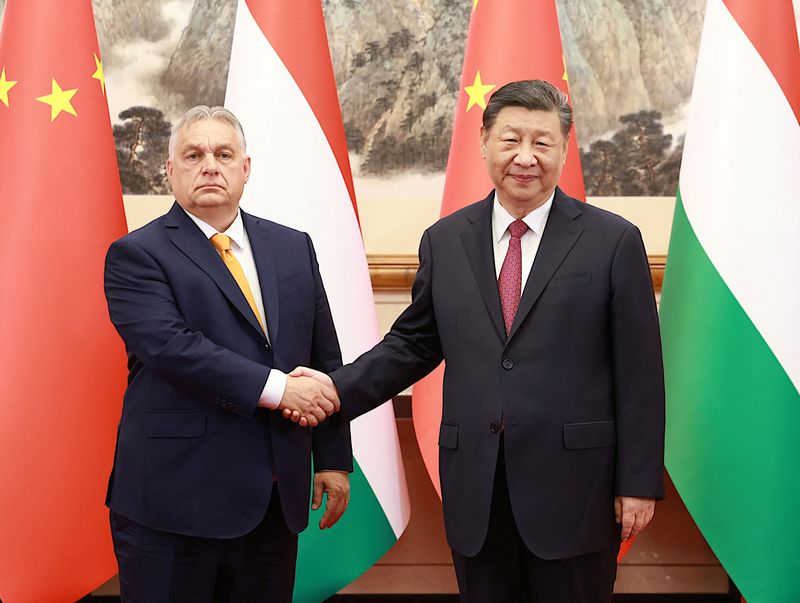By Joe Cash and Anita Komuves
BEIJING/BUDAPEST (Reuters) -Hungarian Prime Minister Viktor Orban met Chinese President Xi Jinping on Monday to discuss a potential Ukraine peace deal, paying the unexpected visit to Beijing days after his talks with Russia's Vladimir Putin angered some European Union leaders.
Orban and Xi met at the Diaoyutai State Guest House in Beijing, Chinese state media reported, for what Orban described as the third leg of a "peace mission" that he has undertaken without the backing of the European Commission or Ukraine.
While Hungary just assumed the EU's rotating presidency this month, Orban has already met with Ukrainian President Volodymyr Zelenskiy in Kyiv and been received by the Kremlin, a trip that drew a strong rebuke from his allies.
"Peace Mission 3.0.," Orban, a critic of Western military aid to Ukraine and the EU leader with the warmest relations with Xi and Putin, said on his official X account as he touched down in Beijing.
China, which has close ties to Russia, has been promoting a six-point peace plan it issued with Brazil in May, proposing an international peace conference "at a proper time" and calling for equal participation by both Ukraine and Russia.
Ukraine is hoping to win broad global backing for its proposals on how to end the war with Russia before beginning discussions with Putin, holding a huge international summit last month in Switzerland to which Moscow was not invited.
But Kyiv's aim of ostracising Russia is meeting resistance. China sat out the Swiss meeting and has won backing from Moscow for its own peace plan. Indian Prime Minister Narendra Modi is now in Moscow, with Ukraine likely to be on the agenda.
"The international community should create conditions for the resumption of direct dialogue and negotiations between the two sides and provide assistance," Xi told Orban, according to Chinese state media.
"It is in the interests of all parties to seek a political solution through an early ceasefire," he added.
Orban said China was "a key power in creating the conditions for peace in the Russia-Ukraine war", giving that as the reason for his meeting with Xi just two months after the Chinese leader visited Budapest.
The Kremlin said that Russia appreciated Orban's efforts to clarify positions in resolving the conflict.
Zelenskiy said Orban could not act as a mediator, a task he said could only be undertaken by world powers.
"Are there many such countries around the world? Not many. I believe the U.S. and China are such countries. And the EU, not one country, but the whole EU," Zelenskiy said during a visit to Poland.
NATO SUMMIT
Orban's trip to China comes days ahead of a NATO summit in Washington, D.C. that will address providing further support to Ukraine and which he is due to attend.
Hungary's leader also comes to China fresh off the European Commission confirming last week that it will impose tariffs of up to 37.6% on imports of electric vehicles made in China.
The central European country has become an important trade and investment partner for China, in contrast with other EU nations seeking to become less dependent on Beijing.
While Beijing threatens to impose retaliatory anti-dumping measures against European pork imports, Peter Szijjarto, Hungary's foreign affairs and trade minister, told Hungarian state media the two sides had negotiated an agreement on relaunching pork and poultry exports to China.
Chinese companies at the forefront of the electromobility transition would also continue to make investments in Hungary that would create about 25,000 jobs, he added.
EU trade policy has turned increasingly protective over concerns that China's production-focused development model could see it flooded with cheap goods as Chinese firms look to step up exports amid weak domestic demand.
China's electric vehicles have become a particular cause for concern because Brussels claims they benefit from unfair state subsidies, an allegation Beijing rejects.

While some EU leaders have been quick to say Hungary's EU presidency does not mean Orban represents the 27-strong bloc, Xi told Orban that China hoped Hungary would "play an active role" in developing China-EU relations.
In Germany, Vice Chancellor Robert Habeck said Orban does not speak for Europe and that Hungary's politics often do not represent the core of EU thinking.